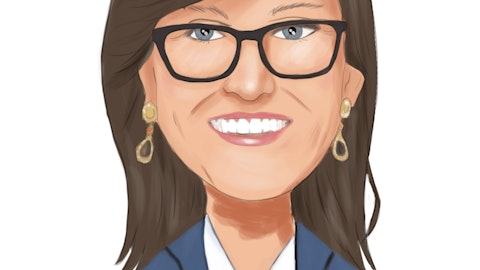Erez Antebi: No. We said…
Ziv Leitman: By definition if we say that the loss will be lower. So it means that the expenses should — cannot grow at the same percentage of the revenues.
Erez Antebi: Eric
Eric Martinuzzi: Okay.
Erez Antebi: I’d like to — I agree with what Ziv said, of course. But I would like to reemphasize, again, we are fully committed to becoming profitable full year in 2024, okay. Now I am not saying that each and every quarter, but for the full year of 2024, we will be profitable. And the only practical way to reach that is to have a significantly lower loss in 2023. So that’s what we are going to do.
Eric Martinuzzi: Understand. Thanks for taking my questions.
Operator: The next question is from Nehal Chokshi of Northland Capital. Go ahead.
Nehal Chokshi: Yeah. Thank you and congratulations on the Verizon deal as well.
Erez Antebi: Thank you.
Nehal Chokshi: What are your expectations on Verizon’s aggressiveness with the go-to-market with their limited to SMB customers that this is initially committed for?
Erez Antebi: Unfortunately, I think, everything has to do with Verizon intentions on go-to-market or their timing or anything like that is confidential, competitive information for Verizon and I cannot relate to any of it.
Nehal Chokshi: Okay. Does this Verizon deal change how you would assess the network security, network revenue ratio of 5% to 8%?
Erez Antebi: I am not sure I followed the question. Could you repeat that, please?
Nehal Chokshi: Yeah. Okay. So I think from your Investor Day from like two years ago, you had presented a top down view of your opportunity. One of the steps was the amount of revenue of 5% to 8% intensity of network security and network revenue. And so my question is that, given this contract with a large provider, does it change your view on that network security, network revenue ratio that top down view that you presented a couple of years ago?
Erez Antebi: Yeah. I think at the top down view, it shouldn’t change it, not necessarily, because it’s doing better or worse or exactly on that number, but because, again, it’s one deal with a single operator for a specific sub-segment or subset of their customers. So I don’t see this — overall, does it change my view of the overall market, I think not.
Nehal Chokshi: Okay. Very good.
Ziv Leitman: And if you
Nehal Chokshi: Yes.
Ziv Leitman: If I understood your question, you relate to the percentage as we said, how much customers are willing to pay for the service between 5% to 8%, right?
Nehal Chokshi: Correct.
Ziv Leitman: So it shouldn’t be changed because of Verizon. This is on average how much according to our experience with many customers, how much they are willing to pay percentage wise out of the connectivity charge or out of the current ARPU.
Erez Antebi: Okay. So now as Ziv — thank you, Ziv. I didn’t fully appreciate the question. Let me provide the response maybe from a slightly different angle. I talked during this call, I think, I said it quite a few times, that we are trying to work with operators where they bundle security-as-a-service as part of their pricing plans and so on. When something like that happened and I am not talking about Verizon, I am talking in general, okay? Something like that happens, then an operator will be offering a plan that is, I don’t know, X dollars per month, whatever. And including that plan there will be so many as, such speed, so many gigabytes of data and security and maybe other things. Now there is — if we do such bundling, I think, it will be it’s great, I think, both for the operator and for us, but there is no distinct line item that says this is how much the customer is paying for security.



